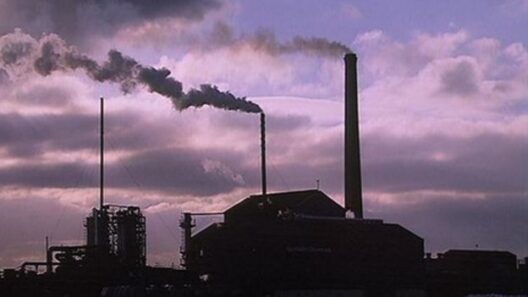As we bask in the sweltering embrace of summer, one might question: Are we merely enduring seasonal heatwaves, or are we standing at the precipice of something far more consequential? The discussion surrounding global warming has become increasingly vital, and yet, the full spectrum of its impact often eludes our understanding. To truly grasp the ramifications of climate change, we must delve deeper than the immediate discomfort of rising temperatures. What challenges does global warming pose beyond the heatwave, and how can we illustrate its multilayered effects?
Global warming, fundamentally, is the steady increase in Earth’s average surface temperature attributable to human activities, predominantly the burning of fossil fuels. This incendiary practice emits copious amounts of greenhouse gases, culminating in a thickening atmospheric blanket that traps heat. However, this scenario unfurls into an intricately woven tapestry of ecological, social, and economic implications, each thread linking back to the phenomena of climate change.
To begin our exploration, consider the cascading effects of heatwaves. Yes, they are immediate and palpable, affecting human health through heat-related illnesses and exacerbating cardiovascular and respiratory conditions. But heatwaves act as harbingers of more extensive changes. For instance, they can precipitate droughts, which in turn adversely affect agriculture and water supply. When crops wither under relentless sun, food scarcity looms—a burgeoning crisis with the potential for socioeconomic upheaval.
Moreover, temperature fluctuations can disrupt the delicate balance of ecosystems. Species that cannot adapt to shifting thermal conditions may face extinction. Aquatic systems are particularly vulnerable; coral reefs—a keystone of marine biodiversity—experience bleaching under exceptional heat, threatening myriad marine organisms that depend on them for survival. The loss of these vital ecosystems reverberates throughout the food chain, resulting in diminished fish populations and jeopardizing the livelihoods of communities reliant on fishing.
As we traverse this extensive landscape of consequences, we must also confront the socio-political ramifications that accompany climate change. Drastic weather events, intensified by rising temperatures, can engender mass displacement as communities become inhospitable. The phenomenon of climate refugees is no longer a distant worry; it is a current reality. Millions may face the heart-wrenching choice of abandoning their homes, fostering geopolitical tensions as nations grapple with the influx of displaced populations.
In an era where climate discourse often obscures these adverse effects, let us ponder an intriguing challenge: how can we convert our acknowledgment of global warming into actionable commitment? Awareness is merely the tip of the iceberg—a fundamental yet insufficient step towards combating climate change. Individuals, communities, and nations must transition from passive recognition to proactive measures.
Implementing sustainable practices is one avenue of opportunity. The adoption of renewable energy sources—solar, wind, and hydro—represents a cleaner custodianship of the Earth, abating our reliance on fossil fuels. It is imperative to accelerate investments in technology that reduces emissions and enhances energy efficiency. Emboldening this paradigm shift, however, necessitates interdepartmental collaboration, involving policymakers, scientists, and local communities in a concerted effort to innovate and apply forward-thinking solutions.
Additionally, communities can bolster their resilience against the deleterious effects of climate change by fostering local initiatives. Urban planning should prioritize green spaces, facilitating rainwater management and reducing the urban heat island effect. Disaster preparedness programs and community education can empower individuals to adapt to environmental changes, mitigating potential damages caused by extreme weather events.
Furthermore, advocacy and activism play pivotal roles in propagating change. Grassroots organizations and collective movements have the power to influence policies at the governmental level. By amplifying the voices of those affected by climate change, society can underscore the urgency of responsive action. Engaging in dialogues that explore innovative ideas around carbon footprints and sustainability can catalyze transformative discussions. So, how do we inspire ourselves and others to not just engage in rhetoric but in genuine, impactful action?
The interconnectedness of climate change means our response must also be holistic. Systemic barriers must be dismantled, fostering justice in environmental policies. Marginalized communities frequently bear a disproportionate burden of climate vulnerabilities. Integrating environmental justice into climate action ensures a more equitable approach, one that considers the most disadvantaged members of society. When vulnerability is met with resilience, we cultivate a more inclusive path forward.
As we confront the colossal challenge posed by climate change, it becomes evident that the conversation extends well beyond the heatwaves. From droughts affecting food security to the plight of climate refugees and socio-political instability, the repercussions are profound and far-reaching. Thus, the question endures: how will our recognition of these complexities galvanize a unified response? The necessity for decisive action is paramount—after all, the solutions we forge in response to today’s challenges will define the world we leave for future generations.
Ultimately, the narrative of global warming transcends mere statistics or forecasts; it is intricately tied to our societal values, ethics, and our overarching responsibility as stewards of this planet. It is time to shift our focus from passive observation to active engagement, collectively forging a path towards resilience and sustainability. In this unrelenting battle against climate change, let us find hope and strength in our collective action—because the world is counting on us.







